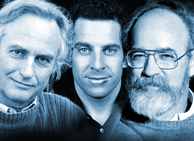 This week I saw The Fountain. While I'm not surprised to see a number of folks hating it, I for one thought it was inspiring, amazing, and genius. I won't attempt a full review or a decipher right now. I'm going to wait until I see it again on DVD, at which point I'll write my interpretation, similar to what I wrote on the Matrix. However, I will say that the film incorporates Eastern and Western philosophy, iconography, and religion, has a profound message, and delivers it in a devilishly confounding manner. If you don't like film as interpretive art or puzzle, then stay away. But if you, like me, relish in films that challenge the viewer's comprehension and have no need to establish an 'official' interpretation, then The Fountain is wonderful.
This week I saw The Fountain. While I'm not surprised to see a number of folks hating it, I for one thought it was inspiring, amazing, and genius. I won't attempt a full review or a decipher right now. I'm going to wait until I see it again on DVD, at which point I'll write my interpretation, similar to what I wrote on the Matrix. However, I will say that the film incorporates Eastern and Western philosophy, iconography, and religion, has a profound message, and delivers it in a devilishly confounding manner. If you don't like film as interpretive art or puzzle, then stay away. But if you, like me, relish in films that challenge the viewer's comprehension and have no need to establish an 'official' interpretation, then The Fountain is wonderful.For now, let me list some articles of my own that touch on its themes, and then some links to reviews and articles I thought were written by some people who are on the right track...
Articles that touch on themes in The Fountain:
• A Naturalistic Approach to Buddhist Karma & Rebirth
• 2.16 Meaning of Life, Transience, and Hope
• Life & Death Are Not Opposites
• The Shimmering Voice
• and possibly, Black Iron Prison
• and I would say my Notes on Chuang-Tzu, however it would be best to read a more full translation available on another site, particularly this chapter on "The Preservation of Life"
Reviews and articles I find near or on the mark (but I always recommend seeing a film before reading reviews!):
• Review by Frederic and Mary Ann Brussat
• Review by Walter Chaw
• Groucho Reviews
• Groucho Reviews interview with creator Darren Aronofsky






